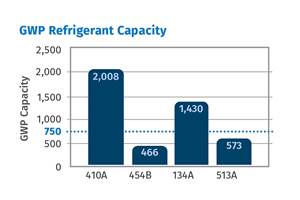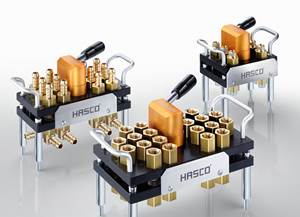'Lights Out' Molder's Watchdog
The job of a mold temperature-control unit (TCU) usually is to ensure continuous flow of cooling water to the mold at adequate temperature and volume.
The job of a mold temperature-control unit (TCU) usually is to ensure continuous flow of cooling water to the mold at adequate temperature and volume. But in the absence of machine operators on the plant floor, TCUs have proven they can take on added responsibility.
The Fastener Div. of Press-Seal Gasket Corp. in Fort Wayne, Ind., took the unusual—and perhaps unique—step of allowing the TCU to shut down the injection molding machine in case of emergency. Press-Seal injection molds sealing products for underground wastewater, and stormwater collection systems, as well as specialized industrial fasteners. It has five rubber injection presses of 400 to 500 tons, plus several rubber extrusion lines and compression presses. About five years ago, the firm bought its first Tempro Basic hot-water TCU from Wittmann Inc. Press-Seal bought a second a year later.
NO OPERATOR IN SIGHT
Press-Seal runs “lights out” five days a week without any operators on site. Because of this, it decided to tie the TCUs’ alarm output to the molding machine, so if something goes wrong in the cooling circuit the press automatically shuts down. For example, if a cooling hose were to leak or break, the TCU will automatically sense a drop in fluid level and trigger the alarm.
“We have probably seen this happen four or five times since installing the TCUs,” says Rick Morrison, operations manager for Press-Seal’s Fastener Div. “So although it doesn’t happen often, we get a substantial benefit in preventing scrap parts and minimizing any fluid leaks from the machine.” In fact, the TCU paid for itself with just one occurrence of the emergency shutdown function.
How did Press-Seal do it? Although Wittmann offers a higher-end Tempro Plus series of TCUs with a full interface to the molding machine, Press-Seal had the lower-cost Tempro Basic version, which comes with a dry-contact alarm that outputs a 24V signal. Press-Seal connected the dry contact to a relay and the relay to the molding machine. The relay output had to be connected to an alarm output that the machine would recognize as requiring a shutdown response. Press-Seal wired the relay output to the machine’s low-oil-level alarm circuit. That alarm triggers an automatic barrel purge, then powers down the machine. Press-Seal has since implemented this on all its presses (and also added emergency press-shutdown capability to its parts conveyors in case of a jam-up).
“Once the TCU tank empties, the unit shuts down, preventing any further mess as a result of a broken line,” Morrison explains. “A broken line could be caused just by normal wear and tear, rubbing on a surface, or even a sprue getting jammed up against the line and then being snagged. The most important thing is that we are not molding parts without any cooling for the whole night. Molding bad parts costs us $2000 to $2500 an hour in lost productivity. We don’t stock parts and only mold to order, so there is no inventory reserve to make up any shortages. That makes every hour of production very important,” he adds.
STOPPING LEAKS
Morrison also notes that his firm purchased the Wittmann Tempro units because they offered more features for the price. “Unlike other units we considered, the Wittmann TCUs have several standard cost-saving features like leak stop and mold purge. Although we don’t use the mold-purge feature, the leak stop has been a lifesaver for us,” says Morrison. “Previously, we had to bring a separate unit over to the machine and hook it up. Now we just push a button and the unit runs in negative-pressure mode. We have been saved about a dozen times already with this feature and have run the units for as long as two or three days in negative-pressure mode to complete the production run.”
Related Content
Temperature Control: What You Need to Know to Comply With New Cooling-Fluid Regs
Beginning the first of this year, 12 states are following EPA bans on potentially damaging cooling fluids. Chiller suppliers have adjusted equipment designs to accommodate the new regulations. Here’s what all this means to processors.
Read MoreHow to Reduce Sinks in Injection Molding
Modifications to the common core pin can be a simple solution, but don’t expect all resins to behave the same. Gas assist is also worth a try.
Read MoreTroubleshooting Leaky Temperature-Control Units
Learn the causes, symptoms and remedies for TCU leaks to keep these vital contributors to plastics processing up and running longer and more efficiently.
Read MoreMulticoupling Range Extended
Hasco‘s quick-connect system for multiple cooling circuits has added U.S., French and HT versions.
Read MoreRead Next
Making the Circular Economy a Reality
Driven by brand owner demands and new worldwide legislation, the entire supply chain is working toward the shift to circularity, with some evidence the circular economy has already begun.
Read MoreBeyond Prototypes: 8 Ways the Plastics Industry Is Using 3D Printing
Plastics processors are finding applications for 3D printing around the plant and across the supply chain. Here are 8 examples to look for at NPE2024.
Read More




















